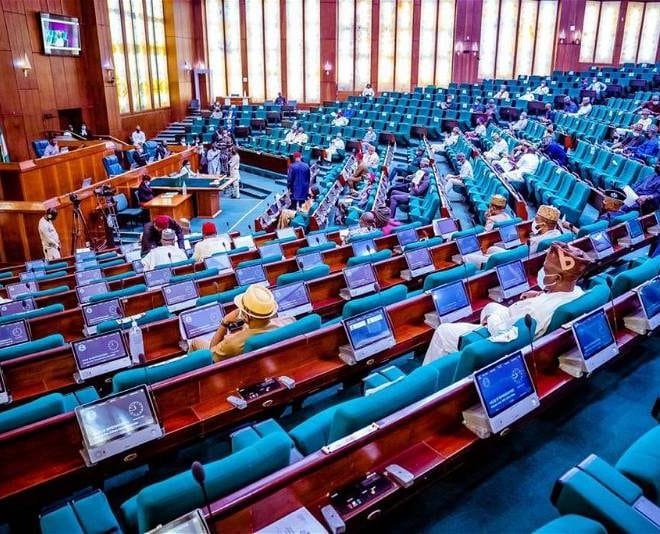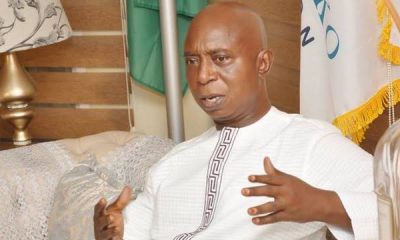Business
Reps To Investigate Bank’s Non-Compliance With CBN Directives On Forex

The House of Representatives will probe banks and financial institutions in the country for failing to comply with Central Bank of Nigeria (CBN) regulations on Net Open Position Limits for foreign exchange.
Moving a motion of urgent public importance for the probe, Babajimi Johnson (APC, Lagos) explained that Sections 8 (4) and (5) of the CBN Act require the CBN Governor to brief the relevant Committees of the National Assembly during semi-annual hearings and to provide periodic reports on the economy’s performance to the Assembly.
Naija News reports that he also voiced alarm over the dollar’s consistent increase relative to the naira, noting that the dollar reached a peak of roughly ₦1,520 last week.
He claimed that a variety of market forces and specific government-adopted economic policies, such as the dollar’s liberalization, are to blame for this phenomenal development.
Instead of lending to their customers to sell when the currency rate is high, the senator claimed that commercial banks and other financial institutions in Nigeria typically retain a sizable portion of the foreign exchange they acquire through purchases, borrowings, or allocations from the CBN.
He expressed concern that the country’s severe economic challenges have been worsened by the speculative acts of commercial banks and other financial institutions, making it harder for lawful firms to get foreign exchange for their operations.
He claims that the CBN has stepped in and implemented new monetary policies, such as Net Open Position Limits and retaining excess long foreign exchange, to restrain the dollar’s appreciation.
He went on to say that some commercial banks and other financial institutions are hesitant to put the monetary measures in place by the national bank to stop these unhealthy behaviours by banks and other financial organizations;
He emphasized that in the absence of immediate legislative action to fulfil these directions, the nation will endure severe economic suffering due to the persistent increase in foreign exchange prices.
According to him, the dollar’s volatility, particularly in the past two months, has had a negative impact on the Nigerian economy and made it harder for consumers and lawful businesses to obtain the foreign exchange they require. For millions of Nigerians, it has also resulted in hardship and an increase in the cost of life.
He argued that although the liberalization of the dollar, or letting market forces determine the exchange rate, is not in and of itself a bad policy, aggressive lending practices by numerous banks and financial institutions have made the nation’s forex liquidity crisis worse and have created significant market distortion, particularly when it comes to exchange rates.
He said that as of January 2024, GTB, Zenith Bank, UBA, and First Bank together possessed excess holdings of more than five billion dollars, with Stanbic IBTC being the only bank that was completely compliant and had made all of the foreign exchange in its reserve available to its customers.
He said, “It is important to note that these banks often obtain the foreign exchange either through purchase, borrowing, or allocation from CBN at the official rate of N461.5 to a dollar for their various customers but will hoard them as part of their bank balances or reserves. They eventually sell at higher rates to make extra profit.
“It is this speculative practice that has prompted the CBN to issue a fresh directive centered around the Net Open Position (NOP) for all commercial banks.
“Simply put, the NOP measures the difference between a bank’s foreign currency assets (what it owns) and foreign currency liabilities (what it owes). Investigations have shown that banks hold far more forex than they require, thereby creating artificial scarcity and an increase in the exchange rate.
“The new CBN directive will help to limit how much foreign exchange banks can hold and for how long. The aim is to discourage hoarding of forex, thereby making it available for intended users at reasonable rates.
“Despite measures adopted by CBN in the past and based on previous experiences with CBN policies directives, many banks are in default of its implementation.
“This explains why eight banks currently hold a huge NOP of over $6bn while there is a biting scarcity. This motion will provide the legislative impetus for the required action to compel them to comply fully with the directive.
“This motion is therefore aimed at exercising the constitutional powers of this House to compel compliance by banks with the CBN directives. This will help to stabilize the naira–dollar rate and make it available to clients who require them for their legitimate businesses.”












